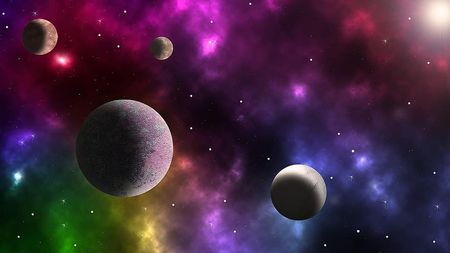
Astronomy and Astrophysics
AUPY581.b. ASTRONOMY AND ASTROPHYSICS
Total Teaching Hours: 54, No. of Lecture Hours/Week: 3,Max. Marks: 80 Credits: 2
Course Outcomes
Students who complete this course will
CO1. be aware of the basic ideas of the science of astronomy
CO2. understand the historical developments in astronomy and astrophysics
CO3. get an idea on the origin of the Universe and celestial bodies in the sky
CO4. get a thorough knowledge on the Solar system, about seasons and development of calendar
Unit 1. Introduction (4 hours)
Astronomy and Astrophysics - importance of astronomy - methods of astronomy and astrophysics -the scientific methods - scope of astronomy. (Book 2, Chapter 1, P 1 – 6)
Unit 2. Astronomy (15 hours)
Birth of the universe - ancient astronomy - medieval astronomy – renaissance astronomy - modern astronomy. (Book 1, Chapter 4, 5, P 65-70, 78-101)
Unit 3. The Objects in the Sky (15 hours)
The microwave background radiation - the sun - the stars - neutron stars and black holes - supernovae – galaxies (Book 1, Chapter 6, P 102 -127)
Unit 4.The Solar System (15 hours)
Sun and planets - formation of the planets - comets - planets and satellites - asteroids - meteorites.(Book 1, Chapter 7, P 128-154)
Unit 5. Earth in Space (5 hours)
Motion of the Earth - the calendar - the seasons. (Book 1, Chapter 8 , P 155 -162)
Book for study and reference:
1. Planet Earth: Cesare Emiliani, Cambridge University Press (1995)
2. Astrophysics: K. D. Abhayankar, University Press ( 2001)
3. Fundamentals of Geophysics : William Lowrie, Cambridge University Press (1997)
4. Modern Physics: R. Murugeshan and K. Sivaprasath, S. Chand & Co. Ltd., New Delhi (2006)
5. Introduction to Astrophysics: Baidyanadh Basu, Tanuka Chattopadhyay and Sudhindra Nath Biswas, PHI, 2nd Edition (2010)
6. Modern Trends in B Sc Physics Physics: C.J. Babu, S.Chand & Co. Ltd., New Delhi (2010)
7. Space Science: Lousie K. Harra and Keith O. Mason, Imperial College Press, London (2004)
8. The Great Universe: G. K. Sasidharan, S. Chand & Co. Ltd., New Delhi (2008)
Total Teaching Hours: 54, No. of Lecture Hours/Week: 3,Max. Marks: 80 Credits: 2
Course Outcomes
Students who complete this course will
CO1. be aware of the basic ideas of the science of astronomy
CO2. understand the historical developments in astronomy and astrophysics
CO3. get an idea on the origin of the Universe and celestial bodies in the sky
CO4. get a thorough knowledge on the Solar system, about seasons and development of calendar
Unit 1. Introduction (4 hours)
Astronomy and Astrophysics - importance of astronomy - methods of astronomy and astrophysics -the scientific methods - scope of astronomy. (Book 2, Chapter 1, P 1 – 6)
Unit 2. Astronomy (15 hours)
Birth of the universe - ancient astronomy - medieval astronomy – renaissance astronomy - modern astronomy. (Book 1, Chapter 4, 5, P 65-70, 78-101)
Unit 3. The Objects in the Sky (15 hours)
The microwave background radiation - the sun - the stars - neutron stars and black holes - supernovae – galaxies (Book 1, Chapter 6, P 102 -127)
Unit 4.The Solar System (15 hours)
Sun and planets - formation of the planets - comets - planets and satellites - asteroids - meteorites.(Book 1, Chapter 7, P 128-154)
Unit 5. Earth in Space (5 hours)
Motion of the Earth - the calendar - the seasons. (Book 1, Chapter 8 , P 155 -162)
Book for study and reference:
1. Planet Earth: Cesare Emiliani, Cambridge University Press (1995)
2. Astrophysics: K. D. Abhayankar, University Press ( 2001)
3. Fundamentals of Geophysics : William Lowrie, Cambridge University Press (1997)
4. Modern Physics: R. Murugeshan and K. Sivaprasath, S. Chand & Co. Ltd., New Delhi (2006)
5. Introduction to Astrophysics: Baidyanadh Basu, Tanuka Chattopadhyay and Sudhindra Nath Biswas, PHI, 2nd Edition (2010)
6. Modern Trends in B Sc Physics Physics: C.J. Babu, S.Chand & Co. Ltd., New Delhi (2010)
7. Space Science: Lousie K. Harra and Keith O. Mason, Imperial College Press, London (2004)
8. The Great Universe: G. K. Sasidharan, S. Chand & Co. Ltd., New Delhi (2008)